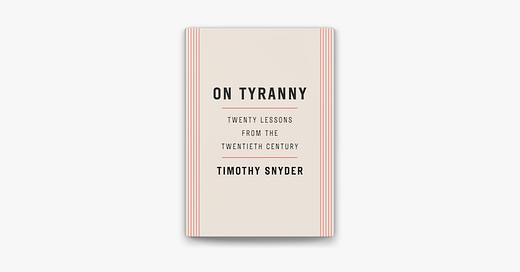Most of the power of authoritarianism is freely given. In times like these, individuals think ahead about what a more repressive government will want, and then offer themselves without being asked. A citizen who adapts in this way is teaching power what it can do.
-Timothy Snyder
Perhaps the most striking difference between the first and second Trump administrations is the level of buy-in from mainstream Republicans and conservatives, and their willingness (or resistance) to taking up roles within the government. These are specifically two different things. In the first, we are talking about ideological submission; during the first term, there was much more hesitancy among Republicans and conservatives to approve of and support the things Trump did, which led to greater friction in policy making. This time around, we are seeing intellectual buy-in become central to the administration's theory of governance; conservatives politicians must publicly state their support, loudly and as vociferously as possible, regardless of past positioning or legal viability or future electoral impact. This is a classic tactic for authoritarian leaders: demanding public declarations of support, often for extreme or ridiculous ideas, as a way of extorting support and holding it over their head.
The second point, about actual mainstream Republican and conservative participation in the Trump administration, in terms of holding office, has run in almost the exact opposite direction from ideological support. During the first Trump administration, many old school Republicans agreed to take roles when asked, as a sort of check on the worst impulses of the President; think of figures like Chief of Staff John Kelly or Secretary of Defense Jim Mattis. This time around, however, the bench Trump had to draw on was much thinner, with the exception of Marco Rubio as Secretary of State. Republicans who want a future career in a post-Trump political environment have realized, it seems, that rhetorical support is fleeting, but forever being labeled as holding office under the Trump administration is much more a millstone around one's neck.
Regardless of the different trajectories in these two approaches to appeasement, they both violate Timothy Snyder's first lesson: "do not obey in advance." You cannot negotiate your way out of tyranny, nor can you soften its blow via your very principled stance from within the regime. And you should whether the storm by trying to anticipate and placate the regime in advance. "Anticipatory obedience is a political tragedy", Snyder writes. In the attempt to save one's own skin, you serve to throw others under the boss, while never really making yourself safe from tyranny in any durable way. Tyranny will chew you up and spit you out to advance its own ends, whether or not you resisted from the start or accommodated it. It's own goal is perpetuation of itself and those inside the very small circle guiding it, and everyone else is expendable. Resistors are annoying and difficult in this sense, mucking up and slowing down oppression; collaborators will gladly tie their own hang knot, never realizing its theirs until it tightens around their throat.
The moves against immigrant communities during these early weeks of the new Trump administration most clearly reveal initial grounds for collaboration and acquiesce. The hope is that the administration is sated by rounding up and deporting immigrants, legal or not, for "crimes" like Constitutionally-protected political speech, and will go no further. You've seen it recently with the case of Mahmoud Khalil, a Columbia student, green card holder, and pro-Hamas protestor, who is currently languishing in an ICE detention facility in Louisiana despite, according to Secretary Rubio himself, committing no crime at all. Sober voices have rushed to assure us that there is nothing to be alarmed at in this trampling of the First Amendment, that Khalil's views are odious and thus he shouldn't be allowed to stay, despite his status as a legal permanent resident. There's a limit to what the administration will do here, they insist; they would never use such tactics against, say, citizens who share Khalil's views. Let them make these moves, and they'll be satisfied.
This is wishful thinking. Even if the speech police never come for you, we all lose out when freedom of speech is curtailed in this way. American liberty as we know rests most crucially on the foundation of unfettered self-expression. Even the most disgusting of speech is protected, because when it is curtailed in the name of decency and public order, it becomes a small step to the next limit, and the next, and the next. Before long, the bounds of safe speech are unknown, freedoms are chilled, and fear reigns supreme.
History teaches us these truths about tyrants. Snyder writes,
In early 1938, Adolf Hitler, by then securely in power in Germany, was threatening to annex neighboring Austria. After the Austrian chancellor conceded, it was the Austrians' anticipatory obedience that decided the fate of Austrian Jews. Local Austrian Nazis captured Jews and forced them to scrub the streets to remove symbols of independent Austria. Crucially, people who were not Nazis looked on with interest and amusement.
History does not look kindly on these on-lookers. They don't get a pass. There is a reason we idolize the resistance in occupied France, or Solidarity in Communist Poland. Those on the side of freedom, openness, and democracy are on the right side of history. And those who stand aside, hoping to ride it out? They get remembered shamefully by history.
Don't obey in advance. Don't assume you can ride it out. Don't accept the subjection of others for the sake of your own safety. Resistance doesn't have to look like large, dramatic action. It is sometimes as simple as the refusal to shackle yourself willingly.




